|
|
|
Sort Order |
|
|
|
Items / Page
|
|
|
|
|
|
|
| Srl | Item |
| 1 |
ID:
180190
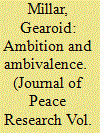

|
|
|
|
|
| Summary/Abstract |
For 50 years positive peace has served as an aspirational goal for many scholars and practitioners of peace. However, much recent scholarly literature evidences a substantial ambivalence toward this ambition, suggesting that prominent theories, policies and practices in the field have failed to support positive peace. This article argues that a key reason for this shortcoming is the field’s failure to respond adequately to the evolving character of conflict (latent and overt) related to technological, legal and economic changes associated with the consolidation of globalization over this period. This consolidation has served to shrink the distances between previously remote actors, to expand exponentially the influence of many institutions, norms, practices and projects as they penetrate new societies, to concentrate power into the hands of ever fewer actors, and to reify instead of deconstruct endemic inequality and marginalization within states, between states, and across the globe. The failure of the field to respond robustly to these changes also prompts concerns about its ability to face sweeping challenges soon to come related to technological innovation, climate change, demographic shifts, labour automation and the search for new governance models. This article, therefore, reaffirms the aspirational goals of peace and conflict studies by building on Lederach’s earlier Peacebuilding Triangle to propose a Trans-Scalar Peace System which would recognize the need for coherent and supplementary policies and actions across scales (global, regional, international, nation and local) and utilize a backward-mapping approach to promote a parity of esteem for actors, institutions and decisions at each scale which would, at the same time, privilege the voice of those with the most pertinent knowledge, experience and capacity for action in support of any given policy or practice. Such an approach would honour the lessons of the ‘local turn’ while developing a global trans-scalar peace system.
|
|
|
|
|
|
|
|
|
|
|
|
|
|
|
|
| 2 |
ID:
180194
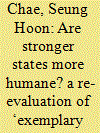

|
|
|
|
|
| Summary/Abstract |
In general, the human rights scholarship finds stronger states to be more humane. In particular, Englehart’s recent book and article assert that ‘petty despots’, rather than ‘exemplary villains’, are the real culprits behind the abuse of human rights. However, some exemplary villains are truly exemplary; providing them with greater powers will only intensify human rights abuses. Indeed, the idea that even dictatorships would better protect rights when stronger contradicts some of the most well-known cases of mass-murder that occurred in powerful authoritarian states. In an attempt to resolve this puzzle, this article argues that, while state capacity does matter, it matters differently for dictatorships and democracies. In both regimes, there are certain types of human rights violations that, from the government’s perspective, happen unwittingly. These unauthorized human rights violations are perpetrated by petty despots trying to benefit from the state’s principal–agent problems. Yet, unlike a democracy, a dictatorship can authorize the violation of certain types of human rights to accomplish its objectives. Whereas state capacity can reduce ‘unauthorized’ types of abuses, it would not necessarily diminish such abuses that are ‘authorized’ by the state. The net effects of state capacity, therefore, will not be as positive for autocracies as they are for democracies. To validate this argument, this article conducts 18 ordered logistic regressions with a time-series cross-sectional dataset that encompasses no less than 142 countries from the period of 1981 to 2002. The empirical analysis provides solid support for the theorized relationship among human rights, state capacity and regime type. As predicted, state capacity improves human rights in democracies but not necessarily in autocracies.
|
|
|
|
|
|
|
|
|
|
|
|
|
|
|
|
| 3 |
ID:
180200
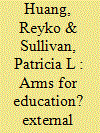

|
|
|
|
|
| Summary/Abstract |
How does foreign support for rebel groups affect rebel governance of civilians during armed conflict? Existing studies primarily examine the local and domestic politics of rebel rule, leaving the effects of foreign intervention on rebel governance underexplored. Focusing on rebel provision of social services, this study considers two competing arguments. The first suggests that foreign sponsorship reduces rebels’ need to rely on local civilians for resources and hence decreases rebels’ incentives to provide services. The second anticipates that by augmenting rebels’ resources and military capabilities, foreign support increases their capacity to provide welfare services. These competing logics suggest that different types of foreign support have divergent effects on rebel social service provision. The article tests this theory using cross-sectional time-series data on external support for rebel groups and rebel governance for the post-1945 period. It finds that rebel groups that receive external funding, weapons or training are significantly more likely to provide education and health services to civilians. In contrast, direct military intervention to assist insurgent forces has no effect on rebel service provision. This article is among the first to systematically study the impact of external support and third-party intervention on rebel social service provision during civil war and holds implications for civilian welfare in contested territories.
|
|
|
|
|
|
|
|
|
|
|
|
|
|
|
|
| 4 |
ID:
180195
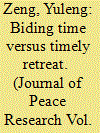

|
|
|
|
|
| Summary/Abstract |
Trade-conflict studies focus on whether and how economic interdependence suppresses interstate conflict initiation. Meanwhile, formal theories of war show that conflict initiation is inherently tied to its termination. In this article, I seek to bridge the two literature by utilizing a war of attrition model to formalize the relationship between economic dependence and conflict duration. I theorize that the strategic calculation ultimately comes down to a trade-off between biding one’s time and retreating in a timely manner. In the context of economic attrition, states weigh the relative costs of suffering an additional round of economic disruption against the potential benefits of winning the disputed good. As such, economic dependence can have both coercive and informational effects and these effects are contingent upon issue salience. When the issue salience is low, the coercive effect dominates; states are more likely to quit conflicts as they suffer proportionally larger economic costs. When the issue salience is high enough, the informational effect can kick in; states are less likely to quit conflicts with increasing economic costs. I test these implications on the International Crisis Behavior (ICB) and the Militarized Interstate Dispute (MID) data, finding strong support for the informational effect and suggestive evidence for the coercive one.
|
|
|
|
|
|
|
|
|
|
|
|
|
|
|
|
| 5 |
ID:
180199
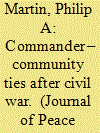

|
|
|
|
|
| Summary/Abstract |
Ex-rebel military commanders play a central role in peacebuilding after civil war. Yet the influence and mobilization power of these actors is not uniform: in some areas commanders retain strong ties to civilian populations after war’s end, while in other areas such ties wither away. This article analyses a novel dataset of former rebel-occupied localities in Côte d’Ivoire to investigate why commander–community linkages endure or decline after post-conflict transitions. The findings support a theory of political accountability: commanders retained political capital and access to networks of supporters in areas where insurgents provided essential goods to civilians during war. By contrast, where insurgents’ wartime rule involved abuse and coercion, commanders were less likely to sustain strong ties. These findings challenge the conventional wisdom that violent warlordism explains the persistence of rebel commanders’ power in peacetime. Rather, effective wartime governance may create regionally embedded strongmen who can in turn disrupt postwar state-building.
|
|
|
|
|
|
|
|
|
|
|
|
|
|
|
|
| 6 |
ID:
180205
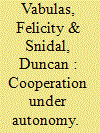

|
|
|
|
|
| Summary/Abstract |
Informal intergovernmental organizations (IIGOs) such as the Proliferation Security Initiative and G20 increasingly play a central role in governing international relations. IIGOs are based on recurrent meetings among high-level state representatives but are not legalized through a treaty and have no permanent secretariat. They allow states to organize internationally without sacrificing autonomy to a supranational entity. We present the IIGO 2.0 dataset, the most comprehensive compilation of these institutions to date, and illustrate the significance of IIGOs through several key empirical findings. First, while the creation of formal IGOs (FIGOs) has plateaued, states are increasingly creating IIGOs to address critical global issues. Second, states disproportionately use IIGOs for high politics issue areas including peace, security, and political agenda-setting which challenges conventional wisdom that IGOs (intergovernmental organizations) are less relevant in the security realm. Third, IIGOs are remarkably durable. Although states could readily formalize or abandon IIGOs, they generally organize cooperation informally for long periods. Finally, IIGOs are typically smaller than FIGOs and this design choice is increasingly used by states of all levels of development, power, and region. The availability of the IIGO 2.0 dataset will promote further analysis on the growing diversity of international institutions.
|
|
|
|
|
|
|
|
|
|
|
|
|
|
|
|
| 7 |
ID:
180204


|
|
|
|
|
| Summary/Abstract |
This article introduces the first comprehensive dataset of frozen conflicts in world politics. It draws on a new, broader conceptualization of frozen conflicts that revolves around an unresolved core issue between the warring parties and transcends the common understanding of frozen conflicts as a recent, post-Soviet phenomenon. The authors identify 42 cases of such conflicts between 1946 and 2011 that include conflict dyads involving both regular states and ‘de facto states’. The article describes the process of dataset construction, presents summary statistics, and identifies key patterns concerning conflict onset, escalation, and resolution. In addition, it provides a comparison of the dataset with enduring rivalries and strategic rivalries to situate it within existing research on conflict escalation and conflict resolution. The dataset is presented in a cross-sectional format compatible with the Correlates of War and the Uppsala Conflict Data Program that can be used by other researchers in peace and conflict studies to provide new insights into the dynamics of frozen conflicts.
|
|
|
|
|
|
|
|
|
|
|
|
|
|
|
|
| 8 |
ID:
180191
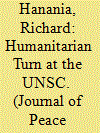

|
|
|
|
|
| Summary/Abstract |
The UN Security Council (UNSC) has transformed from a body almost exclusively focused on conflict to one that addresses a wide variety of issues. Despite a series of powerful works in recent years showing how international norms have developed over time, we still lack clear understanding of why and when international institutions change their missions. This article argues that while international politics is usually characterized by inertia, shocks to the system, or focal point events, can compel rational actors to adopt new logics of appropriateness. Since 1945, the end of the Cold War and the signing of the Helsinki Accords stand out as such events. Through latent Dirichlet allocation, a machine learning algorithm used to classify text, UNSC resolutions between 1946 and 2017 can be divided into the subjects of War, Punitive, and Humanitarian. The topic Humanitarian exploded in frequency after the Cold War, and more refined models show that words related to human rights and elections similarly increased after Helsinki. These changes are rapid and occur in almost the immediate aftermath of focal point events, showing their importance for norm diffusion. The analysis also reveals another shift towards humanitarian topics in the mid-2000s, demonstrating the ability of topic modeling to uncover changes that have been missed by earlier kinds of analysis.
|
|
|
|
|
|
|
|
|
|
|
|
|
|
|
|
| 9 |
ID:
180193
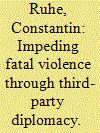

|
|
|
|
|
| Summary/Abstract |
Existing research provides no systematic insights into if and how mediation impedes battle-related deaths. Therefore, this article presents a temporally disaggregated analysis and assesses the effect of mediation on monthly fatal violence. The article predicts that adversaries evaluate opponents’ trustworthiness from both fighting and negotiation behavior. It argues that reducing fighting intensity during negotiations is a sign of cooperation, which can be negotiated by mediators to build trust. Over the course of mediation, the content of negotiations provides information about how genuinely a conflict party is interested in conflict resolution. Only if mediation achieves negotiation of core incompatibilities will conflict parties be willing to reduce fighting intensity. Under these conditions, information revealed in a mediation process can build trust and substantively reduce violence. An empirical analysis of all African conflicts between 1993 and 2007 supports this prediction and shows that on average mediation is followed by substantive and lasting reductions in fatal violence, if mediation discusses the conflict’s main incompatibility. In contrast, mediation on other topics is associated with a small, fleeting reduction in violence. Data of battle-related fatalities in Syria during negotiations as well as qualitative evidence further support the theoretical mechanism and the model prediction. The study concludes that mediation can reduce conflict intensity substantively, if it achieves exchange between conflict parties on the main conflict issues.
|
|
|
|
|
|
|
|
|
|
|
|
|
|
|
|
| 10 |
ID:
180202
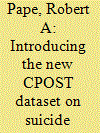

|
|
|
|
|
| Summary/Abstract |
The University of Chicago Project on Security and Threats presents the updated and expanded Database on Suicide Attacks (DSAT), which now links to Uppsala Conflict Data Program data on armed conflicts and includes a new dataset measuring the alliance and rivalry relationships among militant groups with connections to suicide attack groups. We assess global trends in suicide attacks over four decades, and demonstrate the value of the expanded DSAT with special attention to the growing diffusion of suicide attacks in armed conflicts and the large role of networks established by Al-Qaeda and the Islamic State through 2019 in this diffusion. Overall, the expanded DSAT demonstrates the advantages of integration across datasets of political violence for expanding research on important outcomes, generating new knowledge about the spread of particularly deadly forms of political violence, and raising important new questions about the efficacy of current policies to curb their spread.
|
|
|
|
|
|
|
|
|
|
|
|
|
|
|
|
| 11 |
ID:
180198


|
|
|
|
|
| Summary/Abstract |
The unit of analysis in almost all large-N studies on conflict contagion and diffusion is collective actors, such as states and ethnic groups or movements. Thus, contagion dynamics and processes at the individual level have been neglected. Using original data derived from a public opinion survey, this study examines the micro-level dynamics of contagion in the context of Turkey’s Kurdish conflict. The study suggests that transnational ethnic ties, and in particular, cross-border familial bonds and interactions, facilitate conflict contagion through several strategic and ideational mechanisms. First, transborder familial ties and interactions amplify the demonstration effect of ethnic-kin achievements in contiguous conflict countries. Second, cross-border familial bonds facilitate collaboration between cross-border co-ethnics. Finally, such ties to conflict zones with ethnic kin groups empower pan-ethnic identities. The empirical findings show that Kurds living in Turkey who have close relatives in nearby countries hosting conflicting ethnic-kin groups (i.e. Syria, Iraq, and Iran) have stronger ethnonationalist orientations and claims against the center. However, having close relatives elsewhere (e.g. Europe) does not generate the same impact. The Kurdish case evidences that contagion processes and dynamics might vary substantially across the members of a particular ethnic group. Hence, it is necessary to broaden the conventional focus on collective actors in conflict contagion research and pay greater attention to micro-level variables and factors.
|
|
|
|
|
|
|
|
|
|
|
|
|
|
|
|
| 12 |
ID:
180192


|
|
|
|
|
| Summary/Abstract |
International organizations’ ability to respond promptly to crises is essential for their effectiveness and legitimacy. For the UN, which sends peacekeeping missions to some of the world’s most difficult conflicts, responsiveness can save lives and protect peace. Very often, however, the UN fails to deploy peacekeepers rapidly. Lacking a standing army, the UN relies on its member states to provide troops for peacekeeping operations. In the first systematic study of the determinants of deployment speed in UN peacekeeping, we theorize that this speed hinges on the incentives, capabilities, and constraints of the troop-contributing countries. Using duration modeling, we analyze novel data on the deployment speed in 28 peacekeeping operations between 1991 and 2015. Our data reveal three principal findings: All else equal, countries that depend on peacekeeping reimbursements by the UN, are exposed to negative externalities from a particular conflict, or lack parliamentary constraints on sending troops abroad deploy more swiftly than others. By underlining how member state characteristics affect aggregate outcomes, these findings have important implications for research on the effectiveness of UN peacekeeping, troop contribution dynamics, and rapid deployment initiatives.
|
|
|
|
|
|
|
|
|
|
|
|
|
|
|
|
| 13 |
ID:
180201
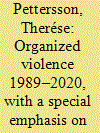

|
|
|
|
|
| Summary/Abstract |
This article reports on trends in organized violence, building on new data by the Uppsala Conflict Data Program (UCDP). The falling trend in fatalities stemming from organized violence in the world, observed for five consecutive years, broke upwards in 2020 and deaths in organized violence seem to have settled on a high plateau. UCDP registered more than 80,100 deaths in organized violence in 2020, compared to 76,300 in 2019. The decrease in violence in Afghanistan and Syria was countered by escalating conflicts in, for example, Artsakh (Nagorno-Karabakh), Azerbaijan and Tigray, Ethiopia. Moreover, the call for a global ceasefire following the outbreak of the COVID-19 pandemic failed to produce any results. In fact, the number of active state-based and non-state conflicts, as well as the number of actors carrying out one-sided violence against civilians, increased when compared to 2019. UCDP noted a record-high number of 56 state-based conflicts in 2020, including eight wars. Most of the conflicts occurred in Africa, as the region registered 30 state-based conflicts, including nine new or restarted ones.
|
|
|
|
|
|
|
|
|
|
|
|
|
|
|
|
| 14 |
ID:
180203
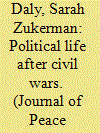

|
|
|
|
|
| Summary/Abstract |
Around the world, following civil wars, rebel and government belligerents contest and win the founding postwar elections. Despite the prevalence of these elections and their importance in setting post-conflict environments on specific political trajectories, their outcomes have been understudied. Existing scholarship centers on the timing and institutions of the postwar elections, but not on their party and voter participants. This article introduces a dataset which traces the postwar political trajectories of civil war belligerents, identifies their successor parties, charts their electoral performance, and documents their decision to remilitarize or demilitarize. The Civil War Successor Party (CWSP) dataset covers all belligerents that have transitioned from civil conflict in the period 1970–2015. The article describes the contours of the dataset, reveals patterns of political life after wars, and outlines the potential uses of the dataset for future research. In particular, it suggests how the data may be leveraged by scholars and practitioners to understand dynamics of political behavior, patterns of governance and public goods provision, quality of democracy, and recurrence of low- and high-intensity war in the aftermath of mass violence.
|
|
|
|
|
|
|
|
|
|
|
|
|
|
|
|
| 15 |
ID:
180197
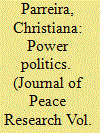

|
|
|
|
|
| Summary/Abstract |
Scholars observe that armed non-state actors (NSAs) often provide social services to reinforce their popular support and legitimacy as guarantors of local order. On the other hand, NSAs usually face funding constraints that make the independent provision of distributive goods difficult. This article argues that armed NSAs employ an alternative, more cost-effective tactic to deliver services. It argues that militant groups can leverage their armed capacity to capture control of and monopolize access to state-sponsored services. As an example, it documents the capture of public electricity infrastructure that took place in post-invasion Baghdad under the Sadrist Movement, an armed group formed shortly after the ouster of the Ba’athist state. Using local-level information about the location of Sadrist offices and remote sensing data, it estimates that Sadrist-affiliated neighborhoods in Baghdad saw an average increase in access to electricity between 2003 and 2006 that was significantly greater than in other areas of the city. The article concludes by addressing threats to inference, showing that these differences are not alternatively explained by demographic differences or changes therein due to ongoing conflict. It also discusses how this NSA strategy might contribute to an equilibrium of low state legitimacy and weak capacity in fragile contexts like that of post-2003 Iraq.
|
|
|
|
|
|
|
|
|
|
|
|
|
|
|
|
| 16 |
ID:
180196
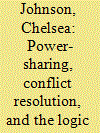

|
|
|
|
|
| Summary/Abstract |
Conclusions about the potential for peace via power-sharing are mixed. For some, power-sharing does little to overcome the commitment problem characterizing a transition from conflict, while others argue that such concessions provide signals of parties’ willingness to incur costs. This article develops and tests a new theory, aiming to shed light on the mechanisms through which power-sharing bargains help to overcome the commitment problem. I argue that government parties tend to hold an electoral and military advantage, which heightens incentives for rebel leaders to defect from a settlement prior to conceding their capacity to use violence. Where settlements provide discrete guarantees that offset the risks of electoral defeat and the co-optation of forces, these incentives for pre-emptive defection should be mitigated. I offer a novel disaggregation of provisional power-sharing subtypes, distinguishing between long-term and short-term arrangements. The analysis rests on an original, cross-national dataset of government-and-rebel dyads to negotiated settlements signed between 1975 and 2015 (N = 168). The logistic regression results clearly indicate that power-sharing settlements stipulating ‘consociational’-style reforms are significantly more likely to resolve conflict between settlement dyads, all else equal. Meanwhile, standard conceptualizations of power-sharing, which include transitional coalitions and troop integration, appear unlikely to secure rebel commitment beyond the transition period, which helps to explain the contradictory findings in existing research.
|
|
|
|
|
|
|
|
|
|
|
|
|
|
|
|
| 17 |
ID:
180206
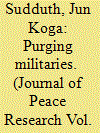

|
|
|
|
|
| Summary/Abstract |
The principal threat most autocratic leaders face stems from within the regime. To control militaries and mitigate the risk of coups d’état, many autocratic leaders repeatedly purge strong officers from the military. What are the causes and consequences of such purges? Despite its importance, scholars rarely have studied the question, as they have lacked a systematic and comprehensive dataset. The Military Purges in Dictatorships (MPD) dataset contains information on the dates and characteristics of 1,007 military purges, and covers 566 political leaders in 116 authoritarian countries over the period 1965 to 2005. In this article, I describe MPD, compare it with other datasets, present descriptive statistics on the data, and suggest its applications. By coding the timing and various characteristics of military purges, MPD facilitates empirical study of the relationships between autocratic leaders and their militaries, and thus is useful for researchers studying political violence, repression, civil-military relations, coup-proofing, leader survival, and regime transition.
|
|
|
|
|
|
|
|
|
|
|
|
|
|
|
|
| 18 |
ID:
180189
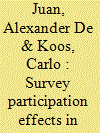

|
|
|
|
|
| Summary/Abstract |
Do survey participants in conflict zones respond differently if they have been interviewed before? Academic and policy interest in postwar political opinion has increased tremendously. One unexpected consequence of this surge of survey research is a growing probability that individuals will be interviewed multiple times. However, if participating in one survey causes respondents to change their attitudes or behavior, their subsequent survey responses may be biased in comparison to the rest of the sample population. Our article aims to investigate such ‘survey participation effects’ in conflict contexts. We draw on original survey data collected in the eastern Democratic Republic of Congo (DRC). In our representative sample, 18% of respondents report that they have been interviewed before. Multivariate analyses demonstrate that their stated attitudes on social relations, political institutions, gender norms, and wartime victimization differ substantively from the responses of first-time interviewees. Moreover, our analyses indicate that experienced respondents have specific response styles – in particular, a tendency to support extreme response options. While substantive bias in multivariate analyses seems to be rather rare, our findings indicate that researchers should be aware of the footprints of data collection efforts in areas frequently targeted by household and opinion surveys.
|
|
|
|
|
|
|
|
|
|
|
|
|
|
|
|
|
|
|
|
|